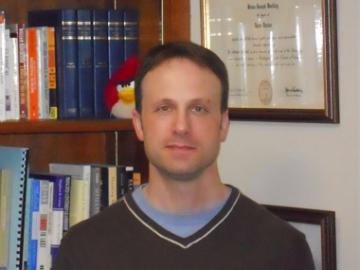
Brian Buckley: Giving Jesuit Voice to Students’ Vision
After transferring from the very large University of Washington to the very small (and Jesuit!) Seattle University as an undergrad, SCU Lecturer Brian Buckley begrudgingly took the required course “Philosophy of the Human Person” even though he felt it had nothing to do with his history major—at least at the time. Ten weeks later? “I wasn’t the same person,” he says. “It had a profound impact on my life.”
Now teaching in the philosophy department, Buckley pulls from this foundational experience to expose and broaden students’ minds to different stories, conditions, and questions—for instance, why certain people happen to be born in a poor region of the world, or have a certain skin color, or gender, or sexual orientation—just as his Jesuit philosophy professor did at Seattle University.
“The exposure to different lives, circumstances, values, and ways of looking at things help foster greater empathy and understanding that many people are deprived of or without,” he says. “The core of a Jesuit education is for all students to become empathetically attuned to questions of social justice. This has to be part of our faith tradition. We’re doing social justice because this is what our faith demands of us. We are supposed to be Christians in what we think and what we do, to see others as our equals.”
When it comes to the classroom, Buckley lives and breathes his teaching style. “I emphasize philosophy even when I’m not teaching philosophy,” he says. “If I can get students to read any text and approach it critically and analyze it, if I can push students the way Socrates did via the Socratic method, it’s because I want them to think. If I’m consistent throughout the quarter in doing this, that’s a huge element of my teaching philosophy.”
Make no mistake, Buckley knows he is an extremely tough teacher. Case in point, there’s a quiz every day on the reading for that day. “But I also lead by example,” he says. “I return papers on time; show up to class on time. We don’t put pictures of mediocre people up on our walls,” he jokes. “I know I should work hard so that others’ lives are better. If you have social justice tied to your religion, it becomes anchored in all that you do.”
Because Buckley strives to help students develop ideas that are already within them, he believes that education is not just about opening up students’ heads to pour information in, but about giving birth to ideas that they haven’t been able to articulate yet. “We learn from each other in this way,” he says. “And when they’re impressed or changed because they discovered these ideas, the reward is spectacular. You feel like, ‘this is why I’m a teacher.’”